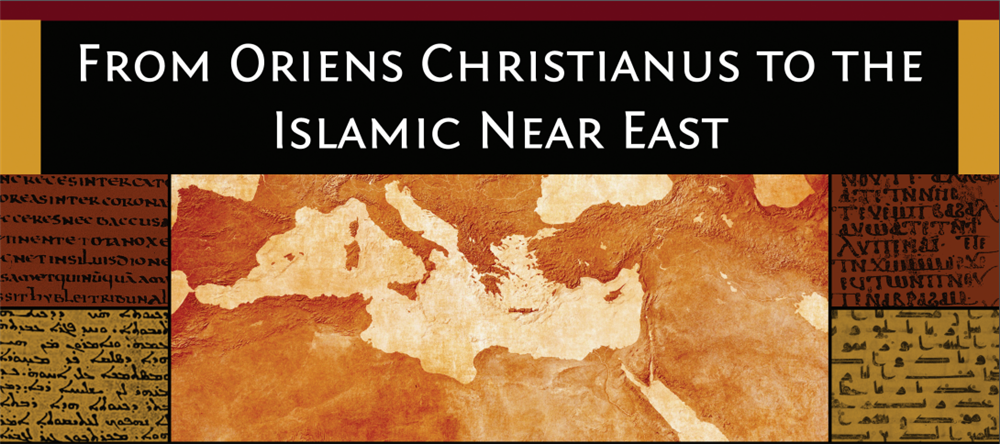From Oriens Christianus to the Islamic Near East – Theological, Historical and Cultural Cross-pollination in the Eastern Mediterranean of Late Antiquity
Date: 7th – 8th December 2017
Venue: Freie Universität Berlin, Topoi Building Dahlem, Hittorfstraße 18, D-14195 Berlin
Admission: Free and open to all interested specialists and Ph.D. students
We are delighted to announce a forthcoming International Workshop: ‘From Oriens Christianus to the Islamic Near East: Theological, Historical and Cultural Cross-pollination in the Eastern Mediterranean of Late Antiquity’. The workshop seeks to shed new light on the crossroads at which the Late Antique world of the Eastern Mediterranean heralded diverse exchanges between Oriental Christendom, Byzantine culture and the Islamic world. Furthermore, how these exchanges impacted the development of diverse regions, cultures, languages, and religions.
The workshop will provide an inter-disciplinary overview of the various perspectives emerging from the Christian Oriental, Byzantine, Early Islamic and Archaeological approaches to this area of research. The key objective of the workshop is to explore the possibilities of a unified and holistic approach to understanding the “Sattelzeit” (R. Koselleck) – i.e. the period between 500 and 750 CE. While the scope of the workshop has been intentionally left broad, the papers will primarily focus on the following areas:
- The role of Eastern/Oriental Christians in the relationship(s) formed between the Islamic Caliphate and the Byzantine Empire.
- Scripture and Arts as a medium of interchange between Christians and Muslims.
- The historical narratives and administrative reality of the expansion of the Islamic Empire.
The workshop will take place on 7th – 8th December, 2017 at Freie Universität Berlin (FU Berlin) and is the collaborative effort of the Chair of Byzantine Studies (FU Berlin), Radboud University, and Gorgias Press.
We hope that the workshop will encourage fruitful discussions about the state-of-the-art of the field and highlight potential areas for future inquiry. We further expect the workshop to provide a platform for both established researchers in the field and early-career academics (including advanced Ph.D. students). The workshop proceedings will be published in an edited volume by Gorgias Press.
For further information about the workshop, please contact Manolis Ulbricht: manolis.ulbricht@fu-berlin.de.
Conveners
Manolis Ulbricht, Berlin Byzantine Studies (Freie Universität Berlin)
Adam Walker, Radboud University / Gorgias Press
_________________________________
Workshop Programme
DAY 1
Session 1
13:30 – Introductory Note
Mr Manolis Ulbricht, Freie Universität Berlin
13:45 – Early Shiʿism as a Late Antique Religiosity: Some Preliminary Remarks
Dr Ahab Bdaiwi, Leiden University
14:10 – The Practice of Empire: The View from Khurāsān
Mr Ahmad Khan, Universität Hamburg / University of Oxford
14:30 – Discussion
15:00 – Tea Break
Session 2
15:15 –The Sophistication of Arguments in Theodore Abū Qurra’s Dialogues with Muslims
Professor Dr Reinhold F. Glei, Ruhr-Universität Bochum
15:40 – Who Wrote the last Greek Documents in Islamic Egypt?
Dr Lajos Berkes, Humboldt-Universität zu Berlin
16:00 – Discussion
16:30 – Conference Edited Volume (Discussion of formalities)
16:45 – Tea Break
17:00 - Keynote
Professor Dr Johannes Niehoff-Panagiotidis,
Chair of Byzantine Studies at the Institute for Greek and Latin Philology, Freie Universität Berlin
Dinner
19:00
DAY 2
Session 3
09:00 – Confronting Ambiguity: Scripture and the Emergence of Self-Definition Under Early Islam
Professor Dr Aaron Hughes, University of Rochester
09:25 – A Tale of Two Conquests: A Local Historian’s View of Islamic Conquest and
Byzantine Reconquest Along the Northern Mesopotamian Frontier
Dr Harry Munt, University of York
09:50 – The Tabūk Expedition Revisited
Mr Adam Walker, Radboud University
10:10 – Discussion
10:40 – Tea Break
Session 4
10:55 – The End of Muʿāwiyah’s Reign and that of the Whole World: Retrospective Overview of John Bar Penkāyē
Ms Yulia Furman, Russian State University for the Humanities
11:20 – Theology as History in the Heresiology of John of Damascus
Professor Dr Peter Schadler, Dickinson College
11:40 – Discussion
12:00 – Concluding Remarks
Mr Manolis Ulbricht, Freie Universität Berlin


